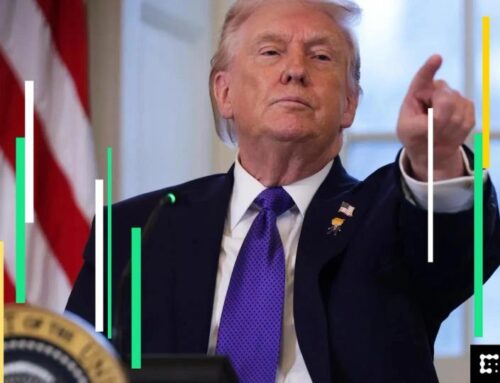Apple stock down after Trump iPhone tariff announcement
May 23, 2025
Apple’s stock has dropped on Friday as trading opened following President Donald Trump‘s Truth Social post in which he wrote that he would implement a 25 percent tariff on Apple if the company didn’t onshore iPhone production.
Newsweek has reached out to Apple for comment by email on Friday morning.
Why It Matters
Trump has repeatedly suggested that companies can save money and avoid paying tariffs by manufacturing in the United States in a bid to boost domestic manufacturing, which the president has said will boost American jobs and the economy.
The iPhone 16 Pro costs between $999 and $1,499 on Apple’s website, depending on how much storage space the phone has.
Currently, the iPhone is produced in China, with some production in Southeast Asian countries like Vietnam. Apple has looked to shift some production to India in order to avoid heavy tariffs on products made in China, and parts for the iPhone are sourced from Japan, South Korea, Taiwan, and others.
After Trump announced a 145 percent tariff on products out of China, and Beijing retaliated with “reciprocal” tariffs on U.S. products at 125 percent, Treasury Secretary Scott Bessent met with his Chinese counterparts and negotiated a significant, but temporary, reduction as a commitment to further trade negotiations.
What To Know
Trump wrote that he had “long ago informed Tim Cook of Apple that I expect their iPhone’s that will be sold in the United States of America will be manufactured and built in the United States, not India, or anyplace else. If that is not the case, a Tariff of at least 25% must be paid by Apple to the U.S. Thank your for your attention to this matter!”
Apple’s stock closed at $201.36 a share on Thursday at 4 p.m. ET, with very little change in afterhours trading. Following Trump’s Truth Social post, the stock dropped to $194 a share as trading opened Friday morning.
As of 11:30 a.m. ET on Friday, the stock has recovered some value at $196.38 a share.

A woman walks a dog by an Apple store at the Westfield UTC shopping center on May 1 in San Diego.
Kevin Carter/Getty Images
The move to threaten Apple with a tariff marks an escalation from Trump who previously suggested he would put the burden of import taxes on foreign countries. In general, importers pay the tariffs and the costs are often passed along to consumers in the form of higher prices.
Dan Ives, the global head of technology research at Wedbush Securities, told Newsweek in a statement last month that onshoring the modern iPhone’s production to the U.S. would more than double the cost to around $3,500 a unit.
“If consumers want a $3,500 iPhone we should make them in New Jersey or Texas or another state. The concept of making iPhones in the U.S. is a non-starter in our view at $1,000,” Ives wrote.
“Price points would move up so dramatically it’s hard to comprehend and the near-term margin impact on Apple’s gross margins during this tariff war could be mind boggling for this U.S. tech stalwart.”
However, CBS News at the same time reported that the phones would only see increases in hundreds of dollars.

Apple CEO Tim Cook is seen at Caesars Superdome on February 9 in New Orleans.
Jamie Squire/Getty Images
What People Are Saying
Treasury Secretary Scott Bessent during an interview with Fox News on Friday said: “The president is trying to bring back precision manufacturing to the U.S., and I think that one of our greatest vulnerabilities is this external production, especially in semiconductors, and a large part of Apples components are in semiconductors, so we would like to have Apple help us make the semiconductor supply chain more secure.”
What Happens Next?
Apple has yet to respond to Trump’s announcement but previously has insisted that the facilities and capabilities needed to produce its products at affordable cost is overseas.
This article includes reporting from The Associated Press.
Search
RECENT PRESS RELEASES
Related Post




